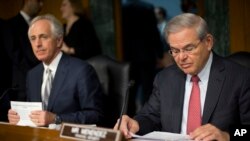Three of America's top national security officials on Wednesday defended President Barack Obama's proposal for new war powers to fight Islamic State militants amid Democratic worries that it could lead to a full-scale U.S. ground war in the Mideast and GOP concerns that it should not ties the hands of the commander in chief.
The legislation, debated in a Senate Foreign Relations Committee hearing, will set up the first war vote in Congress in 13 years.
Committee Chairman Sen. Bob Corker, R-Tenn., said he hopes the hearing will help start a process where both parties can reach agreement on a new authorization to fight IS militants, who have seized territory across Iraq and Syria. Obama sent his draft to Capitol Hill last month.
"As we have received that authorization for the use of military force, what we have come to understand is that - and this is not a pejorative statement, it's an observation - we don't know of a single Democrat in Congress, in the United States Senate, anyway, that supports that authorization for the use of military force," Corker said.
Secretary of State John Kerry, Defense Secretary Ash Carter and Gen. Martin Dempsey, chairman of the Joint Chiefs of Staff, are testifying at the high-profile hearing that is likely to cover myriad U.S. foreign policy issues.
Obama's proposal would allow the use of military force against IS for three years, unbounded by national borders. The fight could be extended to any "closely related successor entity" to the IS, which has overrun parts of Iraq and Syria. He ruled out large-scale U.S. ground combat operations reminiscent of Iraq and Afghanistan.
Republicans expressed unhappiness that Obama had chosen to exclude any long-term commitment of ground forces, while some Democrats voiced dismay that he had opened the door to any deployment whatsoever.
The 2002 congressional authorization that preceded the American-led invasion of Iraq would be repealed under the White House proposal, a step some Republicans were unhappy to see. But a separate authorization approved by Congress after the Sept. 11, 2001, terror attacks would remain in force, to the consternation of some Democrats.
The struggle to define any role for American ground forces is likely to determine the outcome of the administration's request for legislation. The White House has said that the proposal was intentionally ambiguous on that point to give the president flexibility, although the approach also was an attempt to bridge a deep divide in Congress.
Kerry is likely to face questions about international negotiations involving the United States, Western powers and Iran over its nuclear program ahead of a deadline at month's end for a framework.
In an open letter to Iranian leaders this week, 47 of 54 Senate Republicans warned that unless Congress approved it, any nuclear deal they cut with Obama could expire the day he walks out of the Oval Office in January 2017.
Obama, Vice President Joe Biden and former Secretary of State Hillary Rodham Clinton condemned the letter. Senate Democrats said the missive undermined Obama in international talks aimed at curbing Tehran's nuclear program.




